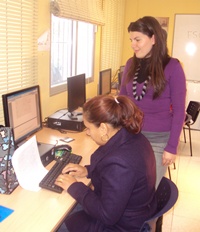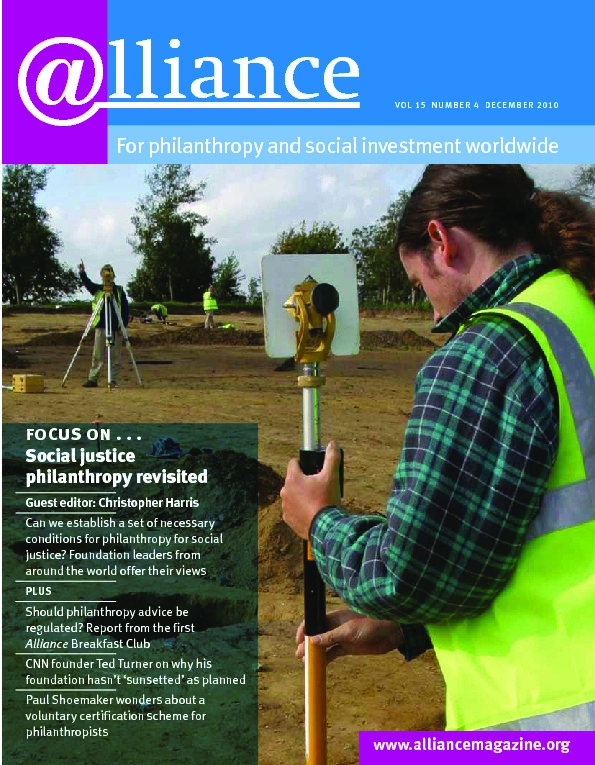French President Nicolas Sarkozy is at the centre of a political storm over his treatment of the Roma – 8,000 have been expelled from France this year. However, though he finds himself isolated from and criticized by other European leaders, France is not alone in its actions. Roma communities in Italy have been regularly subjected to forced evictions under the latest Berlusconi administration. This year has also seen expulsions in Denmark and Sweden; last year Germany paid more than 100 Roma to return to Romania.
For Roma, this is nothing new. Historically demonized and discriminated against, they have long been the subject of persecution and forced deportations. Racial prejudice and hatred climaxed with the genocide of Roma under the Nazis during the Second World War. This has been under-researched and overshadowed by the Shoah. It was not officially recognized by the German state until 1979, on the grounds that ‘Gypsies have been persecuted under the Nazis not for any racial reason but because of an asocial and criminal record’. By the time the West German Federal Parliament determined that Nazi crimes against Roma had been racially motivated, most Roma eligible for compensation had already died.
Assimilation policies accompanied by the forced sterilization of Roma women persisted under Soviet regimes. However, their collapse, if anything, made matters worse. There was an astounding resurgence of anti-gypsy feeling in the majority population throughout Central and Eastern Europe. Educational segregation and the formation of ghettoes accompanied the job losses and impoverishment generated by economic liberalization. Despite the formal recognition of minority rights in post-communist legislation, central governments and local administrations in most CEE countries failed to promote the social integration of Roma. This lack of political commitment prepared the ground for the worsening living conditions and popular rejection of Roma.
The Roma in today’s Europe
At close to 12 million citizens, Roma are the most numerous ethnic minority in the European Union (EU). They are present throughout Europe but highly concentrated in Central and Eastern Europe. Recent EU enlargement and rising unemployment rates and worsening living standards in the new member states have prompted increasing migration from Eastern Europe to the rest of the EU. Despite a small number of effective private and public initiatives in specific countries in the past couple of decades, Roma communities have not reaped the benefits of sustained economic growth in Europe. Generally speaking, there is a wide, and in some cases widening, gap between the living conditions (in terms of health, education, labour and housing) of the Roma and the majority population.
The Roma community has repeatedly expressed its desire for social integration and improvement of its living conditions and welfare. Neither assimilation nor exclusion has ever yielded positive results for the Roma; the only effective measures have been social policies based on the guarantee of rights and responsibilities. What the Roma community needs is opportunity: salubrious housing, better education for Roma children, and dignified employment. Following centuries of exclusion, the Spanish experience over the past three decades demonstrates that sustained welfare and social inclusion policies can result in the effective social, economic, cultural and political integration of Roma.
The Roma in Spain
While Roma continue to experience poverty, exclusion and discrimination in Spain, they have made more progress there in the past three decades, in terms of living standards, social inclusion and political participation, than in the preceding five centuries. This progress can be traced to five key factors.
Democratization after Franco
First, the process of democratization that has taken place in Spain since 1978 has given the Roma the opportunity, for the first time, to consider themselves and to be considered as full citizens with rights, responsibilities and equal access to social protection, ready to play an active role in society. Underpinning this is a rule of law that protects all citizens equally and without distinction. During the Franco era, the Roma lived in fear of police persecution; after Franco the police protected Roma children when they were not allowed to enter schools.
 EU accession
EU accession
Second, Spain’s joining of the EU in 1986 has produced a dramatic improvement in the population’s living standards, from which Roma, like the rest of Spain, have benefited. Job opportunities, primarily through self-employment and family businesses, have allowed the Roma to improve their living standards. In the 1970s and 1980s, street markets, collection of scrap and other waste, and seasonal work in agriculture employed most of the Roma. Today Roma are also increasingly entering the formal labour market, particularly the services sector, through personalized labour insertion programmes such as Acceder, developed by Fundación Secretariado Gitano (FSG) throughout Spain. The Acceder programme has obtained 36,000 work contracts for its beneficiaries, the majority of whom are Roma women, since its creation in 2000. The photo shows Rosa Belén Muñoz Valadés, of the FSG centre in Don Benito, Extremadura, helping Roma women gain suitable skills for the workplace.
Improved welfare programmes
Spain’s relatively young welfare system has benefited the most vulnerable sectors of Spanish society, including Roma. In 1990, more than 50 per cent of the Roma benefited from social housing financed by the government. While these services were not aimed solely at Roma, generally speaking Roma got from the state more houses, income and social benefits than non-Roma; they became the primary users of many services allocated to people in or at risk of exclusion – crucially, services targeted at people in need rather than at Roma per se.
Targeted measures at local and regional level
Fourth, at the same time regional and local governments have implemented programmes and measures explicitly aimed at redressing the disadvantages of Roma. These have focused on areas such as housing, employment and education. Most Spanish institutions and citizens understand that where a group of people demonstrates significant disadvantage or special needs, special measures are required to address them.
Civil society on the side of Roma
Last but not least, since the 1960s Spain has witnessed a significant mobilization of civil society in favour of the Roma community, reinforced by a kind of ‘mainstreaming’ of Roma culture. The engagement of civic movements, initially promoted by the Catholic Church, has played a crucial role in creating mutual understanding between Roma and non-Roma, promoting Roma rights, supporting community leaders, and raising awareness of public institutions as well as citizens about the needs of the Roma. Fundación Secretariado Gitano has played an active role in this process from the beginning.
The challenge for Europe
Today, Europe faces a challenge. The challenge, highlighted by recent events in France, is not merely the social integration of Roma and other vulnerable groups but giving substance to the ideals of social justice, democratic maturity and equality before the law that underlie the construction of the European Union. In short, the essence of the European project itself. The protection and welfare of people and the guarantee of fundamental rights are at the centre of a struggle locally, nationally and across Europe, with no determined outcome. It is time to mobilize all progressive forces against the injustice of racial discrimination.
France, Italy, Romania, Bulgaria, indeed all EU member states, have the means to achieve the social integration of the Roma community. I am convinced that the majority of French people have a more noble idea of national identity than their government’s actions suggest, motivated as they are by an electoral logic that revives the ghost of unequal rights justified by racial or ethnic distinctions. The authoritarian and coercive policies implemented by the French and Italian governments, among others, confuse immigration and insecurity and look for scapegoats in order to divert public attention from the country’s structural problems, demonstrating a myopic understanding of history and a profound disregard for the progress achieved to date. Coercion has proved totally ineffective in achieving social cohesion in the past and will do so again.
The treatment of the Roma is symptomatic of Europe’s malaise. Upholding fundamental rights is a vital precondition for peace and social cohesion in Europe. Inaction against discrimination, prejudice and violence today will incur profound political and other costs tomorrow.
Europe’s civil society must continue to play a role in the promotion and distribution of common goods with a view to securing a dignified life for everyone. Fundación Secretariado Gitano is playing such a role. It has developed social inclusion measures aimed explicitly at Roma, and fostered the active participation of Roma workers and beneficiaries in the design, implementation and evaluation of its projects. Other foundations in Europe could follow this example.
José Manuel Fresno is Adviser for Ethnic Minorities in the European Union and President of Spain’s Council for Equal Treatment and Non-discrimination on grounds of Race and Ethnicity. Email josemanuel.fresno@gmail.com
 Comment Bernard Rorke
Comment Bernard Rorke
José Manuel Fresno’s article identifies key factors in the progress on Roma inclusion in Spain: democratization after dictatorship, followed by accession to the EU, and comprehensive, improved welfare provision, combined with measures to address disadvantage at regional level; processes buttressed by pro-Roma civil society mobilization.
Democracy and EU accession was a path followed by many countries in Central and Eastern Europe, but this brought no benefits to Roma. In fact, their situation worsened with the advent of the free market and multi-party democracy. The Spanish model illustrates how best to use EU funding to consciously promote social cohesion and combat poverty for Roma communities. In the newer member states, those communities in most need are the least able to access EU funding.
The example of Spain highlights the need for a comprehensive policy approach that specifically focuses mainstream policies on minorities. There has been little evidence of such an approach across Central and Eastern Europe. It requires knowledge and political will. From the side of the municipalities, partnerships with community-based civil society organizations are vital to close the implementation gap. Civil society organizations have much accumulated knowledge. From the side of the CSOs, partnerships with municipalities are essential to transform project-based knowledge into sustainable change.
Integration should be understood as a two-way process. Roma inclusion will remain elusive unless the principle and substance of Roma participation is embraced by national governments and local municipalities. Without consultation and dialogue to assess the needs and aspirations of communities, without a participatory ‘bottom-up’ approach to developing integration policies, future efforts will prove to be as ineffective as those of the past.
The Spanish experience of wide civil society mobilization in favour of the Roma is very pertinent. The need to challenge prejudices and stereotypes and to counter populist and racist discourse is ever more urgent in the face of a rise in hate speech and hate crime, and the electoral gains of far-right political parties targeting Roma. The Roma issue does not just concern Roma – it should be the concern of all right-minded citizens. If there is one lesson to be learned, it is that choosing coercion over inclusion, choosing to denigrate and segregate a minority rather than respecting and integrating its members as fellow citizens, is damaging − and not just for Roma. It is corrosive for the entire society, and destroys the liberal content of democracy.
Bernard Rorke is Director of International Advocacy and Research, Roma Initiatives, Open Society Foundations, Budapest, Hungary. Email brorke@osi.hu
 Comment Costel Bercus
Comment Costel Bercus
Let me comment on each of José Manuel Fresno’s five factors and the implications for the treatment of Roma in Central and Eastern European (CEE) countries.
First, democratization after Franco. The rule of law as well as the active participation of Roma in all areas of public life has helped Roma in Spain to achieve a better position than Roma-related groups in other countries. The key element is democracy, which the CEE countries still lack in terms of respecting and protecting minority rights, law enforcement, and access to public services such as health, education and the labour market.
Second, with regard to EU accession, Spain has made good use of available EU financial instruments to address the social and economic gaps between different target populations. Moving Roma from informal to formal labour markets is one of the success stories of the Acceder programme. In comparison, new member states are still lacking both political commitment and absorption capacity – they have difficulty making use of EU funds to improve the situation of the most vulnerable groups.
Third, improved welfare programmes. We need to refer to the EU Basic Common Principle of ‘explicit, but not exclusive’ targeting when it comes to Roma inclusion policies. Spain’s approach seems to have got it right. As Fresno underlines in his article, more than 50 per cent of the Roma have benefited from social housing, financed by the government, even though the services are not aimed solely at them. One important lesson to learn in Central and Eastern Europe is how to avoid housing policies that reinforce segregated Roma settlements, thereby impeding overall efforts for greater inclusion.
Fourth, targeted measures at local and regional levels. Again, we need the right balance between mainstreaming and targeting, and local and regional authorities have a critical role here. Unfortunately, in CEE countries, they are less willing to address the issues Roma are facing for a number of reasons including growing hostility towards Roma among their constituencies over the last few years, demonstrated in growing support for the extreme right.
On the last point, civil society participation on the side of the Roma, Spain has longer experience of mobilizing civil society to support Roma communities and culture. Roma culture does have its place in Central and Eastern Europe, but it does not carry the same weight as it does in Spain in terms of supporting overall social inclusion. Civil society can and does make a difference and I think there are a lot of similarities in the experiences of Spain and other European countries.
Finally, I believe that there are many lessons to be learned by other European countries in looking at Spain’s experience. However, we need to create the space for debates with EU institutions, governments and civil society in order to understand more deeply the degree to which it is transferable to other European contexts.
Costel Bercus is Chair of the Roma Education Fund. Email cbercus@romaeducationfund.org
 Comment Lisa Jordan
Comment Lisa Jordan
Spain, as noted by José Manuel Fresno, does indeed have a better record than most European countries in effective integration of Roma communities. Is it because of democratization and EU adhesion? Many countries in Europe have taken similar paths and sadly have not achieved the same results for their Roma populations. Similarly, many states have social welfare systems oriented to compensate the most disadvantaged, which ostensibly should include Roma but are not specifically designed for Roma.
For me the key missing ingredient from Jose Manuel Fresno’s five factors is the implementation at local and regional levels of programmes specifically designed for Roma populations who are severely disadvantaged. This is a missing ingredient throughout Europe and one foundations can help develop. Another factor that is prevalent in Spain but missing in other EU nations is political will.
In most of Europe, the communities who most need philanthropic help are Roma communities, which is why the Bernard van Leer Foundation will focus its resources on creating better opportunities for the youngest and most disadvantaged European citizens, Roma children. As happened in Spain with the Fundación Secretariado Gitano, foundations have an enormous amount to contribute to realizing Roma rights.
The European Commission and Parliament have taken up the call of the EFC’s Forum for Roma Inclusion to focus on early childhood, employment opportunities for Roma transitioning from school to work, and respect for Roma rights and culture. The Parliament chose to support these three issues through their first pilot projects to support Roma communities, including a specific project on early childhood. The Forum is also advocating for European structural funds to be used for projects that target Roma needs, including housing, education and employment opportunities. Bernard van Leer Foundation is funding direct service delivery for young Roma children in Western Europe while our coalition partners fund in the CEE region.
Action at the local level is where it matters most. We are in dialogue with Eurocities and other partners to implement programmes in cities like Stockholm, Graz and Belfast that are taking the issue of social inclusion seriously. Again, foundations in Italy and France could make all the difference in local efforts to integrate Roma populations.
In the absence of leadership from states, it is up to civil society to champion Roma rights and create opportunities for Roma. If foundations, often associated with the most prominent and successful members of European society, do not uphold the values inherent to the European Project – which, make no mistake, are under siege today – who will? As Fresno noted, ‘Inaction against discrimination, prejudice and violence today will incur profound political and other costs tomorrow.’ Foundations simply cannot afford to stand by and allow Europe to be unravelled one deportation at a time.
Lisa Jordan is executive director of the Bernard van Leer Foundation and a member of the EFC’s Forum for Roma Inclusion. Email Lisa.Jordan@bvleerf.nl



Comments (0)